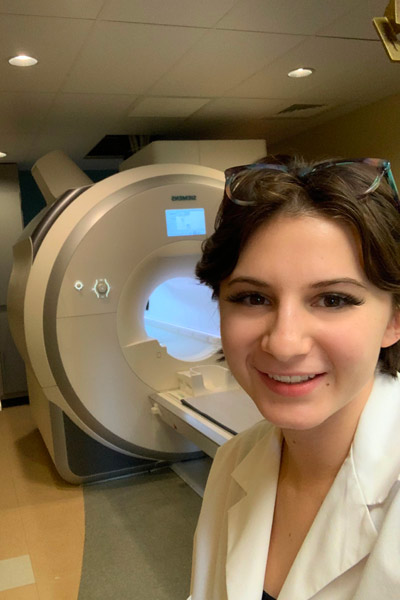
Major: Psychology
Psi Chi
National Residence Hall Honorary Regent ScholarTitle: Impact of Stress and Trauma on Learning and Decision-making in Psychosis
For my project I am examining the connection between childhood abuse and performance on a learning task in people with and without schizophrenia.”
Who is your mentor(s) for your project? How did you find your mentor? Why did you choose them?
I have two mentors for my senior thesis, one at the MPRC, Dr. James Waltz, and one at UMBC, Dr. Raimi Quiton. I met Dr. James Waltz when I got an email from UMBC’s Psychology Department that the MPRC was looking for an intern to work in the IDRIS lab. I wanted to work for Dr. Waltz because he does neuroscience and psychology research. I formally met Dr. Waltz in the second round of interviews. I met Dr. Quiton when I was looking for someone to sponsor me for my Psych 397 research credit for research I was doing in translational toxicology at the University of Maryland, School of Medicine. We were introduced through Dr. Etopio who had sponsored my 398-internship credit the semester before. After deciding to do a senior thesis I asked Dr. Quiton to be my UMBC mentor because we already had a connection and she also does neurobiological and psychology research.
How did you become interested in this project?
I have always been interested in the impact of childhood abuse and neglect across a person’s lifetime. This interest, as well as my position working in a lab studying schizophrenia, ultimately led to my decision to study the intersection of these topics. Over time, I became more interested in specific questions such as the differential impacts of childhood abuse and schizophrenia on win-stay and lose-shift responses within the task as I became more acquainted with the task.
What has been the hardest part about your research/what was the most unexpected thing about being a researcher?
The hardest part of my research has been listening to clinical interviews and scoring questionnaires. Many people with psychotic disorders like schizophrenia have experienced trauma in their lives that you learn about through interviews and questionnaires. I want to research child abuse because I love children and I want to help and protect them. It hurts to know what the many study participants have gone through, especially when they were children.
What has been the most rewarding part?
The most rewarding part of doing research for me has been working on projects that I know are going to help patients and in being a part of someone getting help for their mental illness. The people at the MPRC really care about everyone that comes into the center, even those who are coming in as controls.
How will you disseminate your research
I am planning on publishing my senior thesis as well as presenting it in a poster URCAD and at UMB’s research day. I will also be presenting this research at the 2023 annual meeting of the Society for Research in Psychopathology in St. Louis, Missouri.
What is your advice to other students about getting involved in research?
Don’t be afraid to be told no. All no means is no, it doesn’t mean you’ve failed. If you see something you want, ask for it. If you see someone doing research you want to be doing, ask them if you can be a part of it. It’s much easier to get a position that was created for you than it is to apply to the position 100 people are applying for.
What are your career goals?
Currently, I am applying to clinical psychology doctoral programs that focus on neuropsychology. It’s rare to be accepted directly out of Undergrad, so I will likely take up a full-time research position after I graduate and apply again next year. I want to work with children with traumatic brain injuries as a result of abuse and neglect and research/ develop treatment plans to help them regain functioning.
8/31/2023